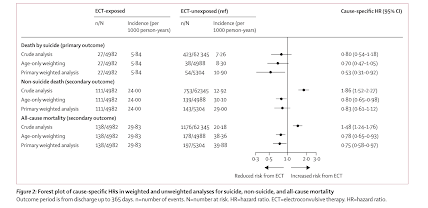Risk of Suicide Death After ECT: New Study From Canada
Out on PubMed, in Lancet Psychiatry, from investigators in Canada, is this study:
Risk of suicide death following electroconvulsive therapy treatment for depression: a propensity score-weighted, retrospective cohort study in Canada.
Lancet Psychiatry. 2022 Apr 26:S2215-0366(22)00077-3. doi: 10.1016/S2215-0366(22)00077-3. Online ahead of print.PMID: 35487236
Background: Previous studies examining the risk of suicide death after treatment with electroconvulsive therapy have been confounded and the resulting uncertainty around the risk-benefit profile of electroconvulsive therapy might contribute to its underuse. We aimed to compare the risk of death by suicide after psychiatric hospitalisation among individuals with depression who had been exposed to electroconvulsive therapy with those who had not.
Methods: This was a propensity score-weighted, retrospective cohort study using linked population-level administrative health data for adults with depression who had been admitted to a designated psychiatric bed in Ontario, Canada for more than 3 days between April 1, 2007 and Dec 31, 2017. Electroconvulsive therapy exposure was defined as one or more physician billing procedure codes during hospitalisation. The primary outcome was death by suicide identified using administrative health records within 365 days following discharge. We used cause-specific Cox proportional hazards model to estimate the cause-specific hazard ratio (csHR) for electroconvulsive therapy-exposed and electroconvulsive therapy-unexposed individuals. Secondary outcomes were non-suicide death and all-cause mortality.
Findings: In the analytic cohort, there were 67 327 psychiatric hospitalisation records (27 231 men and 40 096 women; mean age 45·1 years [SD 16·8; range 18-103]), of whom 4982 were exposed to electroconvulsive therapy and 62 345 were not exposed to electroconvulsive therapy. No ethnicity data were available. In propensity-score weighted analyses, electroconvulsive therapy was associated with a significantly reduced risk of suicide death (csHR 0·53 [95% CI 0·31-0·92]). Accounting for non-suicide death as a competing risk had no effect on the findings. Electroconvulsive therapy was also associated with a significantly reduced risk of all-cause mortality (0·75 [0·58-0·97]), but not non-suicide death (0·83 [0·61-1·12]).
Interpretation: Among individuals admitted to hospital with depression, electroconvulsive therapy is associated with a significantly reduced risk of death by suicide in the year after discharge. This study reinforces the importance of electroconvulsive therapy, particularly for people with severe depression.
Funding: Norris Scholars Award, Department of Psychiatry, University of Toronto, and the Canadian Institutes for Health Research.
The article is here.
This is a very important study that will have a great impact on the reputation of ECT. A high quality study, using "advanced observational study design methodology to address the methodological limitations of previous studies," is exactly what the field needed. Finally, ECT is shown to reduce death by suicide!
And from the text:
I recommend a full and careful read of this paper to all healthcare professionals involved with ECT, ~30 minutes, with an additional ~10 minutes to re-read selected sections.








Comments
Post a Comment